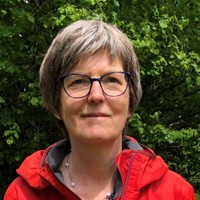In English further down.
Lärartillsättningar och docentur – ett lagarbete
I mitt förra blogginlägg skrev jag om arbetet i ITM-skolans anställningsutskott (AU) tillsammans med vice ordförande Anne-Kathrin Peters och handläggare Sara Andersson. Parallellt med detta arbetar ett annat team med docenturfrågor. Min kollega Kristina Andersson, ordförande i ITM:s docentutskott (DU) och biträdande ansvarig för läratillsättningar, leder detta arbete tillsammans med vice ordförande Bengt Wittgren och Sara. För den här bloggen bad jag Kristina att berätta lite om arbetet i DU.
Kristina Andersson:

Tack för möjligheten att få prata om docentur. Jag har arbetat med dessa ärenden under de senaste åren som biträdande FFA. Från och med i år hanteras docenturärenden i DU. Varje ärende inleds med kontakt från prefekten, som lämnar information om kandidaten. Därefter kontaktar jag kandidaten och ber om ett CV, som jag granskar för att säkerställa att de huvudsakliga kriterierna är uppfyllda. (Krav innefattar forskningsmässig självständighet, vetenskaplig kompetens på hög internationell nivå samt omfattande erfarenhet av handledning, inklusive doktorander.)
KTH:s regler för antagning som docent (Eng, PDF)
Om jag bedömer att kriterierna är uppfyllda initierar jag och DU:s vice ordförande en extern granskning. När granskningen är klar sammankallas docentutskottet, som består av lärar- och studentrepresentanter, och kandidaten bjuds in till intervju. Intervjun ger oss möjlighet att fördjupa oss i pedagogiska frågor, handledningsfilosofi samt jämställdhet, mångfald och inkludering. Docentutskottet diskuterar kandidatens meriter och lämnar en rekommendation till skolchefen. Om kandidaten antas som docent hålls en föreläsning för att uppmärksamma utnämningen.
I mina kontakter med institutioner och kandidater är det tydligt att docentur är en viktig del av karriärutvecklingen, både för individen och för KTH. Många institutioner har brist på handledare för doktorander, så nya docenter är mycket uppskattade.
Det är intressant att notera att antalet docenturer på ITM har fördubblats under 2025 jämfört med tidigare år, med omkring tio nya docenter som förväntas bli utnämnda i år. Denna trend syns även på andra delar av KTH.
/ Kristina Andersson, ordförande i ITM:s docentutskott
Tack Kristina! Vi gratulerar årets nya docenter och ser fram emot fler ansökningar framöver.
/ Andrew Martin, ansvarig för lärarförsörjning (FFA) vid ITM-skolan
Faculty renewal and docentships, a team effort
In my last blog I wrote about the work done in ITM’s employment committee (AU) with vice-chair Anne-Kathrin Peters and officer Sara Andersson. In parallel another team works with docentships. My colleague Kristina Andersson, chair of ITM’s docent committee (DU) and deputy head of faculty renewal, leads this work with vice-chair Bengt Wittgren and Sara. For this blog I’ve asked Kristina to say a few words about the work done in DU.
Kristina Andersson:
Thanks for the opportunity to talk about docentships. I have been working with such cases for the past couple of years as deputy FFA. Starting this year docentships have been handled in DU. Each case starts with contact from the head of department who provides information on the candidate. Thereafter I contact the candidate and ask to see a CV, which I review to ensure that the main criteria have been fulfilled. (Requirements include research independence, demonstration of scientific competence at a high international level, and significant experience of supervising students including PhD students.)
KTH’s regulations for admission as docent (PDF)
If I am satisfied with this then the DU vice-chair and I initiate an external review. Once the review is complete docent committee is convened, consisting of teacher and student representatives, which invites the candidate to an interview. This allows us to delve more deeply into pedagogical issues along with supervision philosophy and gender, equity, and inclusiveness. The docent committee discusses the candidate’s qualifications and provides a recommendation to the head of school. If the candidate is appointed as docent then a lecture is held to mark the achievement.
In my contacts with the departments and candidates it is clear that docentships are a critical part of career development, benefiting the individual and also KTH. Most departments have a shortage of PhD supervisors so having new docents on board are highly appreciated.
It’s interesting to note that the number of docentships at ITM has doubled for 2025 as compared to other years, with around 10 new docents expected to be appointed this year. This trend has been reported across KTH.
/Kristina Andersson, chair of ITM’s docent committee
Thanks, Kristina! We both congratulate this year’s new docents, and we look forward to new applications going forward.
/Andrew Martin, Head of Faculty Renewal (FFA) at the ITM School
